Did you know that Dhaka residents take 3 hours to cross a distance of fewer than 10 km? Or that one man built a plane just to cut his 14-minute commute to work in half?
If you think your commute is bad, you might change your mind after reading this guide. We will:
- Look at the commuting definition and find out why we don’t like to commute,
- Talk about different commuting options around the world,
- Dive deeper into unusual and unusually long commutes,
- Take a look at the numbers — from 5 countries where people commute the longest to 20 cities where you’ll spend the most time stuck in traffic,
- Discuss how to make the most of your commute time, even when your commuting takes too long, and
- So much more.
Long story short, it’s everything you need to know to put your own commute into perspective. So, let’s dive right in.
What is commuting and why don’t we like it?
If you have ever searched for the meaning of the word commute, you might have seen something like this:
“To travel regularly to and from a place and especially between where you live and where you work.”
Of course, this commuting definition covers the meaning of the word, as all the dictionary definitions do.
But, the part that we can never find in a dictionary is all the stress and anxiety lurking behind this simple word.
When there’s piled up stress in the picture, it’s easy to understand why we dislike commuting.
In fact, compared to all the rest of our daily activities, commuting causes the most stress.
Apart from all the anxiety and tension, what we don’t like about commuting is the fact that we do not have any control over it. Whether you’re sitting in your car or standing on a packed up bus, chances are that you won’t be able to do more than wait if there’s a queue of vehicles in front of you slowly crawling down the lane.
The rest of the story is quite clear — the lack of control and unpredictability further increase our stress levels and we end up despising our daily commute.
Still, despite all the frustration, the majority of people across the globe have to move around their cities to show up at work every morning.
How do people around the world commute
People in different parts of the world opt for different means of travel — they include:
- Motorbikes
- Cars
- Ferries
- Minibus taxis
- Bicycles
- Trains
But, these are only some of the popular choices.
When we take a closer look at the ways people from all over the world travel, it’s easy to see that their choices vary.
How people commute in Bangkok
For example, Bangkok (1) is reported to have 8 times more cars than its existing roads can realistically accommodate, so traffic jams are quite common.
A more pleasant alternative are boats — people who have to cross Bangkok’s canals usually opt for this way of commuting to work.
How people commute in Vietnam
Bicycles and motorbikes are a famed means of commuting in Vietnam (2) — there are more registered motorbikes than there are households.
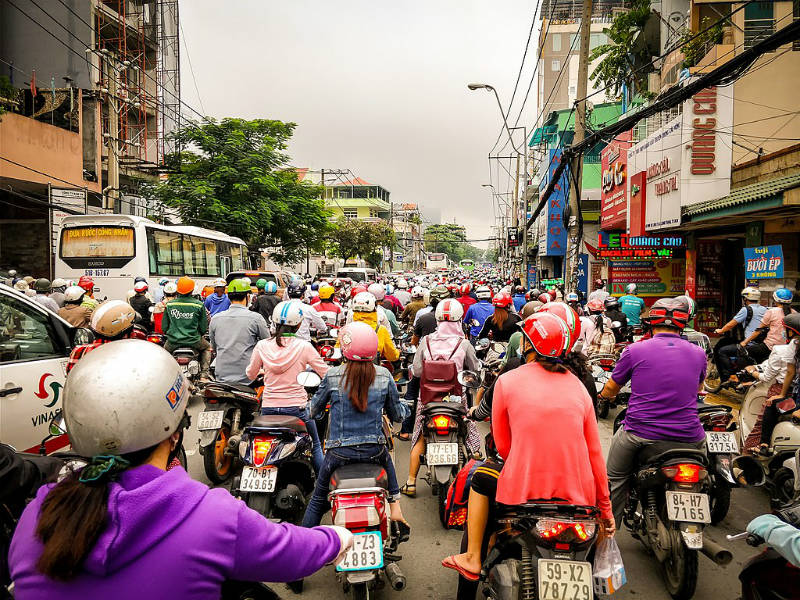
How people commute in Istanbul
Ferries are a popular commuting option for Istanbul (3) workers — probably because some of them live in the European part of the city, and have to cross the Bosporus strait to get to their workplaces in the Asian part of the city, and vice versa.
How people commute in South Africa
People from Johannesburg (4) in South Africa often commute with minibus taxis, who pick people up along the road — people have to learn specific hand gestures that signal the driver they want to board or get off.
South Africa (5) as a whole also has an unusual taxi-related phenomenon — Taxi wars between minibus taxi drivers and regular taxi drivers are common enough to have their own Wikipedia page.
How people commute in Amsterdam
In Amsterdam (6), the cycling capital of the world with 881,000 registered bicycles, bicycle traffic jams are not an unusual sight.
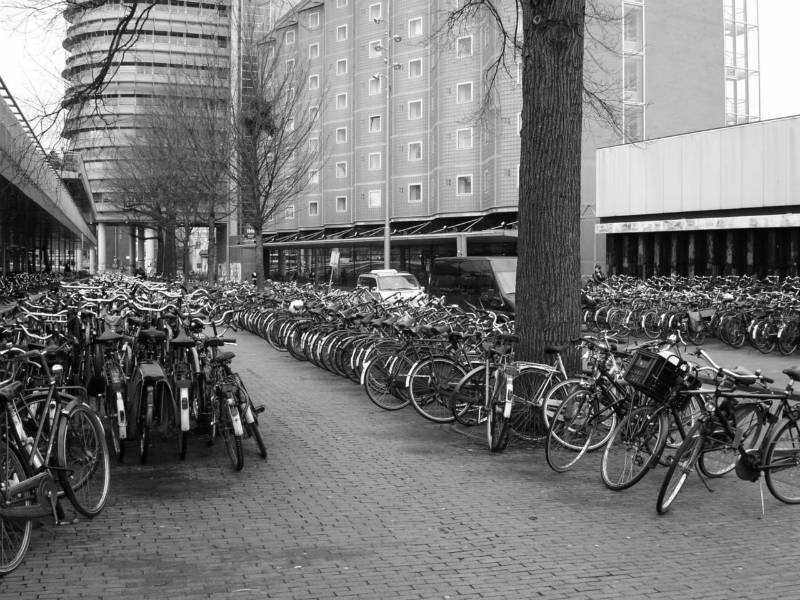
Worst, unusual, and unusually long commutes
If you commute every day, it’s easy to believe you have it worse than your colleagues who instead have to endure just a short walk to work.
But, some people around the world most likely have it much worse than you do (or at least much, much weirder) — and here are their stories:
Commuting while pressed for space
In India (7), 23 million passengers commute by train every day — some by hanging onto the side of the train, as there’s usually no room for everyone on the actual train.

In Tokyo (8) alone, 6.84 million passengers every day commute to work on overpacked trains, probably with no personal space at all.
There’s even a person called a Pusher (“railway station attendant” is the more elegant term), whose job is simply to push people onto trains before they’re even able to close the doors.
Trains, metros, and subways in New York, Beijing and Madrid (9) also employ this kind of personnel from time to time.
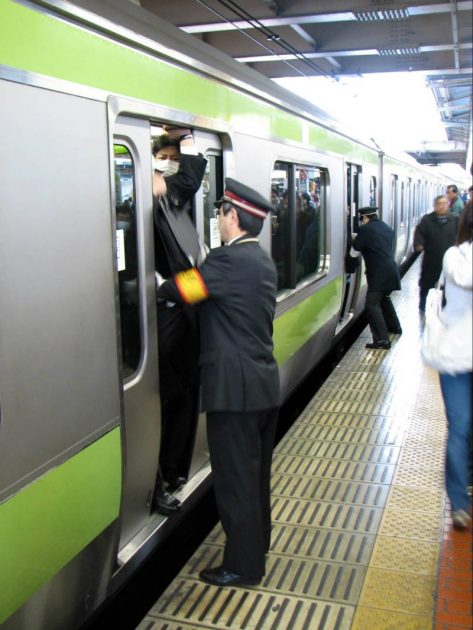
Unusually long commutes from around the world
Everyone’s heard of Extreme sports and Extreme couponing — but fewer people have probably heard of Extreme commuting.
Probably because it’s not really something you’d want to take part in.
Extreme commuters are people who travel more than 90 minutes in one way — and many of them have intriguing (and sometimes even brutal) commute schedules to share:
Sheila James, a public health advisor from Stockton
She wakes up at 2:15 a.m., changes 2 trains and a bus, to get to her workplace at 7 a.m. in San Francisco.
She has an 80-mile (129 km) commute to work every day.
Sam Cookney, a social media manager from Barcelona
He may live in Barcelona — but he takes 2 trains and a cheap flight in order to get to his workplace in London at 9:30 a.m. every day.
He may have to commute longer than if he chose to live in the same city (or at least in the same country) where his workplace is. But, as he claims, the rent is cheaper.
David Givens, an electrical engineer from Mariposa
He used to undertake a 372-mile (526 km) commute to work from Mariposa to Cisco every day — an endeavor which, depending on the traffic, took about 3.5 hours in one way.
For this unusually long commute, he has won $10,000 in a contest for “America’s Longest Commute”.
Musavvir Mahmud Seazon, a Research Assistant at Bangladesh University
In theory, it should take him 33 minutes to travel 16 miles (9.9 km). At least, that’s what Google Maps suggests.
In reality, many Dhaka residents have to endure somewhere between 1.5 and 3 hours every day to cross such a small distance, due to near-impossible traffic jams.
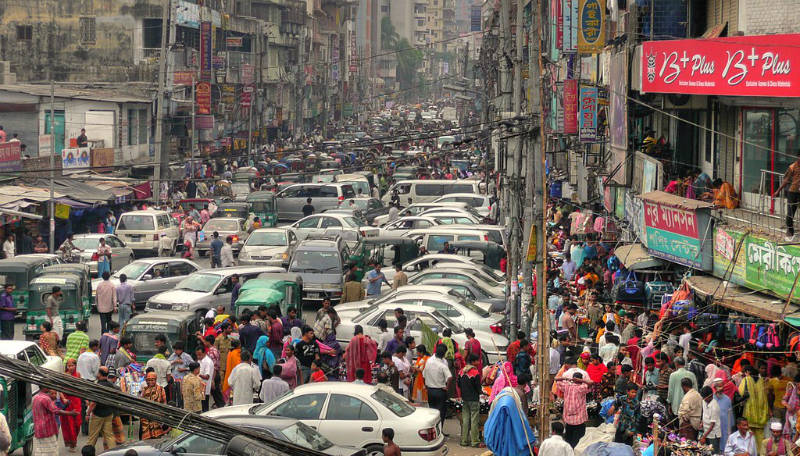
Many, many workers from Beijing…
There are also entire cities that experience excruciating commutes. Beijing workers who live on the outskirts of town, for example, have to endure a 6-hour commute every day to-and-fro work.
Simply unusual commutes
Sometimes people just pick unusual routes to save time. Other times, they simply build their own means of transportation to travel faster.
Abdul Mallik, a teacher from India
He chooses to swim through a river every day to get to his students — as an alternative to a 3-hour bus ride he’d have to endure otherwise.
Paul Cox, a Royal Navy overseer from North Wales
He travels for work from Gwalchmai to Holyhead Boatyard in North Wales by paramotor — and he needs to gain clearance from the Royal Air Force every time before take-off.

Frantisek Hadrava, a locksmith from one Czech village
He considered his 14-minute drive to work too demanding — so he built himself a plane to cut that commuting time in half.
Many, many workers from Bolivia…
The idea that you can avoid traffic jams by flying over them isn’t just wishful thinking.
Bolivians as a people can enjoy some wonderful sights and amazing views during commutes, considering some of them commute by cable cars.
Many workers from Wuppertal, Germany
Every day, over 80 000 people from Wuppertal, Germany, get around their city sitting on a hanging train. The suspension monorail was first opened in 1901 — and ever since its opening, it has been attracting thousands of tourists every year.
Because of its worldwide popularity, the witty solution to traffic congestion, Wuppertal Schwebebahn, became the city’s trademark.
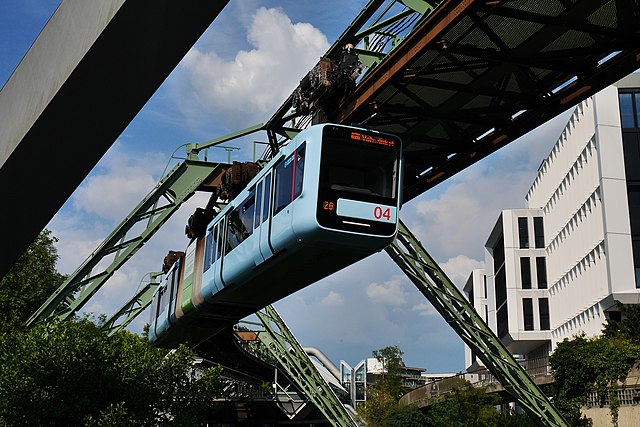
What is your daily commute to work like?
So, you can probably rest assured that your own long commute isn’t the worst, or the most unusual.
You probably don’t fly a plane or paramotor to work, or spend 6 hours on the road in total every day.
But, you most likely do spend a certain amount of time on commutes.
So, here’s how average people commute to-and-fro work, what means of transportation they use, and how long it all takes — traffic jams included.
Countries where people commute the longest
We all waste time commuting. But, since our daily commute time differs depending on the country we find ourselves in, we need to look at the numbers.
Going over the data collected by Numbeo, we’ve managed to pinpoint the exact countries that hold the unflattering title of being one of the top 5 countries with the longest average commuting time.
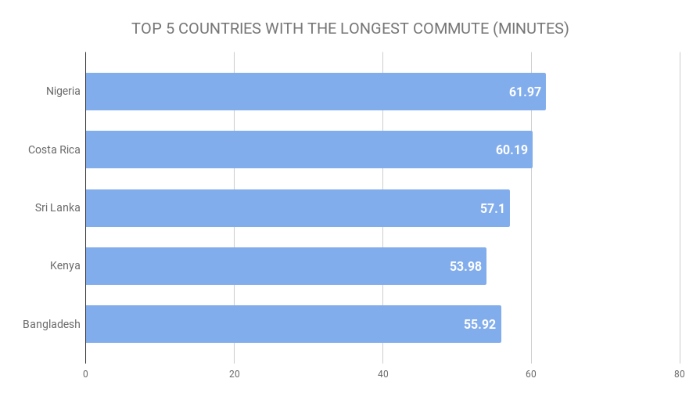
Nigeria is a narrow winner in this category — with 61.97 minutes, it surpasses the second country with the longest commute, Costa Rica, by 1.78 minutes.
Sri Lanka (57.1 minutes), Kenya (53.98 minutes), and Bangladesh (55.92 minutes), round up the top 5.
Countries where people commute the shortest
Looking further into the data, it becomes clear that the global commute is not beyond all hope. There still are places where you won’t spend eternity commuting from one place to another, and we’ve listed the top 5 countries with the shortest average commute time.
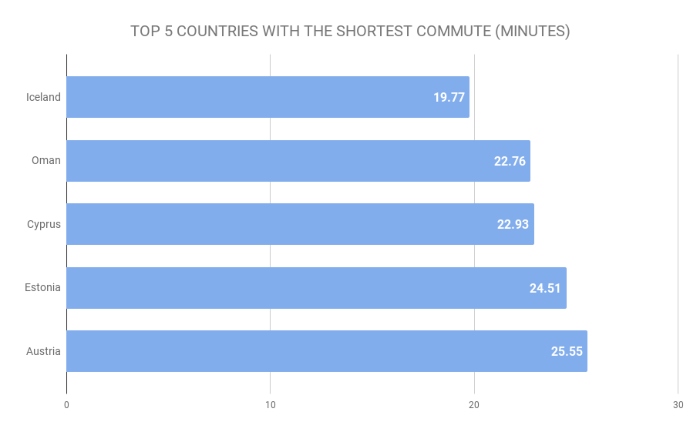
Iceland is a sure winner with 19.77 minutes on average.
People from Oman take slightly longer to commute (22.76 minutes), while Cyprus (22.93 minutes), Estonia (24.51 minutes) and Austria (25.55 minutes) round up the list of the top 5 countries with the shortest commute — with no country reaching half an hour.
Cities where people commute the longest
In case your country wasn’t among the top 5 countries where people spend the most time commuting, you can consider yourself lucky.
But, what about your city?
We’ve looked into Numbeo’s data and listed the top 5 cities with the longest commute.
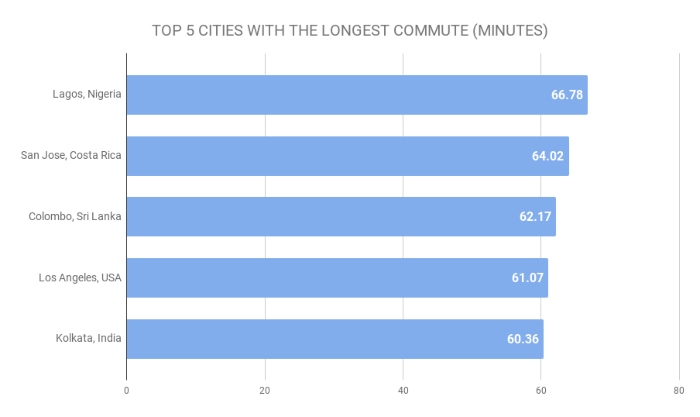
Famous for its swift development, Nigeria’s boomtown, Lagos, managed to win a sweeping victory. Since commuting in Lagos in 2021 took 66.78 minutes on average, the city surpassed San Jose by 2.76 minutes.
Citizens of Colombo commute a bit faster (62.17 minutes).
Although commuting in Los Angeles (61.07 minutes) and Kolkata (60.36 minutes) took slightly less compared to the top three cities, the average commute time is still over an hour — so they round up the list of the top 5 cities with the longest commute time.
Cities where people commute the shortest
It’s not a secret that people dislike the part of their day they spend commuting, and there’s even research to back this up.
But that still doesn’t mean that there aren’t cities where the commute time doesn’t take forever and a day. The list of the top 5 cities with the shortest commute time is proof that moving around a city can take less than 20 minutes.
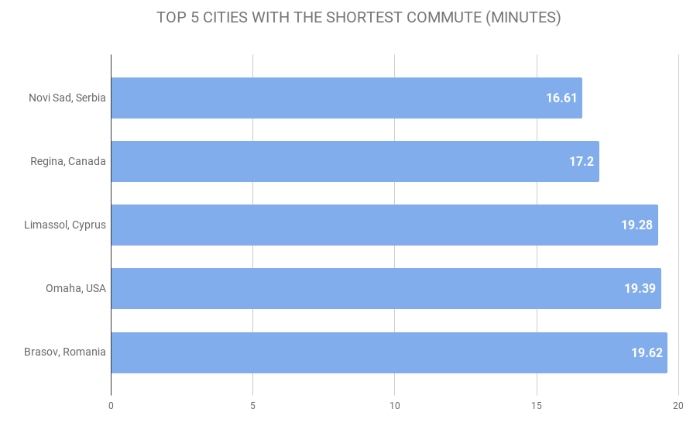
Citizens of Novi Sad wasted the least amount of time commuting in 2021. Their average commute time was 16.61 minutes. Although there’s a possibility that last year’s traffic was reduced due to a lot of people working from home, which led to less time wasted commuting, the city nonetheless secured a well-deserved victory.
It took a fantastic 17.2 minutes to move from one point to another for all the people living in Regina.
Although it takes slightly longer to reach your destination in Limassol (19.28 minutes), Omaha (19.39 minutes) and Brasov (19.62 minutes), it’s still possible to arrive in less than 20 minutes.
Most common modes of transportation by city
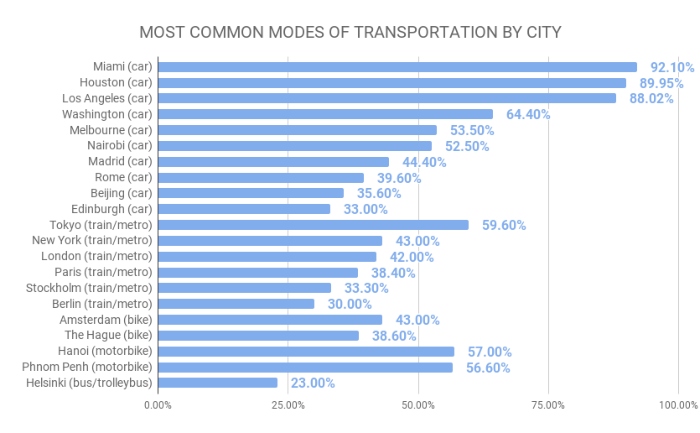
As evident, cars reign supreme, with many prominent cities choosing it as a means of travel, such as:
- Miami (where a whopping 92.10% of workers commute by car)
- Houston (89.95%)
- Los Angeles (88.02%)
- Washington (64.40%)
- Melbourne (53.50%)
As expected, commuters from Tokyo (59.60%) and New York (43%) usually take the train or metro.
In Phnom Penh (56.60%) and Hanoi (57%), motorbikes are the most popular (and most practical) way of traveling to work.
Although Amsterdam is the world’s cycling capital where bicycles are the most popular means of travel (43%), 38.60% citizens of another city in the Netherlands, The Hague, prefer moving through the city by bike too.
And Helsinki is one of the rare cities that favors the bus or trolleybus (23%).
Modes of transportation in the USA
Means of transportation in the USA alone vary, according to the Statista’s Modes of transportation for commuting in the U.S. 2021 report.
Here’s what means of transportation USA workers used the most in 2021:
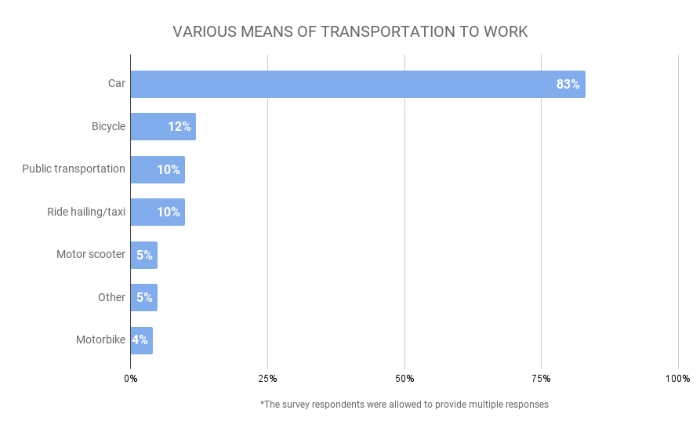
Most workers opted for cars, bicycles, taxis or ride-hailing services, and public transportation.
Cars have definitely reigned supreme (84%), while bicycles took on a significantly lower share since only 12% of commuters used them in 2021.
Public transportation, on the other hand, was a less popular choice, since only 10% of commuters decided to travel to work this way.
Time people spend stuck in traffic
Commuting time is only half of the story.
People also spend a substantial amount of time simply stuck in traffic, sitting aimlessly in their seats, with the feeling that the long line of vehicles is never going to move.
Here are the 20 cities with the worst traffic in the world, according to the INRIX 2021
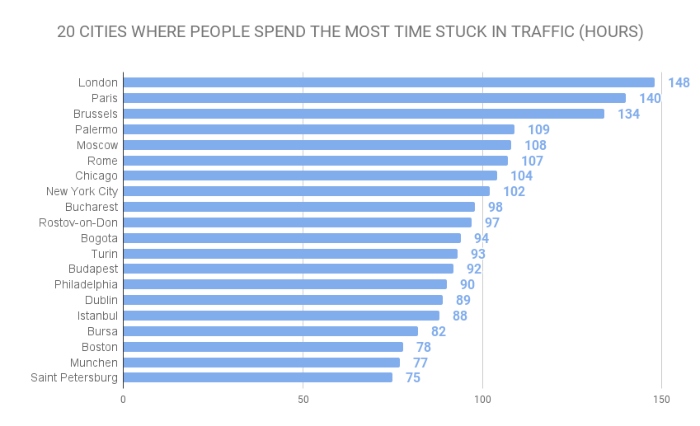
London “wins” 1st place, with 148 hours people have spent stuck in traffic in 2021.
Paris comes right after, with 140 hours spent stuck in traffic.
Munchen and Saint Petersburg seem to have it easiest, with 77 and 75 hours of wait-time in traffic, respectively — though this is still more than 3 days a year of being stuck in traffic.
The final commute time equation
In case you’re lucky enough to spend only 15 minutes commuting to work, you surely are better off than the people who spend hours stuck in traffic.
But, considering that you do it for at least 260 days a year, you waste a surprising amount of time just moving from one point to another.
Your 15-minute commute per day (30-minute round trip commute) adds up to 5 days per year you lose to commuting.
If that number isn’t shocking enough, think about all the things you could have done instead of driving your car or sitting on a crowded train. Instead of wasting 125 hours in traffic, you could have watched over 80 movies or even slept 2 hours longer than you’re used to during your workweek.
In case you’re among the not-so-lucky workers who waste an hour traveling to work, last year you could have learned a foreign language, or just have had 500 hours at your disposal to do anything you like to do.
💡 Clockify Pro Tip
Not only do we waste time traveling to work, but sometimes we waste it even more while at work. Find out why it happens and how to put a stop to it from:
Effects of long commutes to work
Not only does commuting take away from the time you could spend on more pleasant activities, it also takes its toll on other areas of your life. In short, long commute can:
- Increase costs
- Affect your family and work life
- Cause physical and mental health problems
And here are the downsides of long commutes in greater detail:
Physical health problems caused by long commutes
It’s far from surprising that long commutes affect your physical health, and science has already proven that.
One study in particular claims that 19% of people who commute over 30 minutes view commutes as big mental and physical burdens.
According to a study from the American Journal of Preventive Medicine, longer commutes may cause metabolic and cardiovascular health problems — you have to sit more, which leads to less time for exercise, which in turn causes your blood pressure to rise.
Your chances of becoming overweight also increase.
Another study, published in BMC Public Health, supports these findings and adds that long commutes are also likely to increase your stress and decrease your energy levels.
People who have to suffer long commutes also call in sick more often, because they are more likely to fall prey to various illnesses.
Mental health problems caused by long commutes
Long commutes are also likely to exhaust you emotionally and cause a number of mental health problems — considering that you’ll have less time for important non-work activities, such as sleep.
One UK study covering 34,000 adults states that commuting longer than 30 minutes leads to increased stress and decreased productivity levels.
Long commuters are 40% more likely to have financial worries, and also 12% more likely to suffer from work-related stress.
Depression is one other problem you may encounter — people who suffer long commutes are 33% more likely to suffer from this serious mental illness.
Anxiety is another likely problem that emerges from traveling a long way to work — The UK’s National Statistics data that covered responses from 165,000 people shows that London commuters are the most anxious people in the UK.
Looking into our overall life satisfaction and happiness, another study has found that remote work and the absence of commuting improve our wellbeing. When the time we spend commuting is reduced or completely eliminated, we tend to be more satisfied with both our jobs and all the non-work activities that we now have more time to give our attention to.
Other issues caused by long commutes
Apart from mental and physical issues, long commutes can also cause other problems.
The most common, although not unexpected, phenomenon is that these people are more likely to get divorced, according to research from Umea University in Sweden.
And the reason?
Commuters spend even less time with loved ones, which causes couples to grow apart.
The same research states that couples who stay together for 5 years while one of them is commuting, are more likely to stay together in the future — and “weaker” relationships are likely to fall apart before the 5 years are up.
So, commutes are a great, though often unpleasant and unwelcome, way of testing a relationship.
One popular alternative to commuting
After 2020, there’s probably not a single person on this planet who doesn’t know about the alternative to commuting. It’s working from home, of course.
But, the idea of eliminating commute time did not start with the pandemic.
Just a couple of months before the pandemic outbreak, Andrew Van Dam from the Washington Post talked about the increase in the numbers of remote workers.
“No commute”, as the fastest growing type of commute, began its slow rise in 2018.
Then, after 557 million people started working from home in 2020, coming back to the office and the old ways of wasting hours in traffic became a thought too hard to handle for millions of people. In fact, many workers from all around the world would rather visit their dentist or do their taxes than commute to work.
But even though experiments show that people who work from home are 13% more productive than in-office workers, working remotely still comes with a fair share of downsides.
From finding it hard to remain motivated to feeling isolated from the rest of the team, remote workers face a handful of challenges.
Still, since 50% of the American workers currently work from home, maybe the benefits outweigh the downsides.
How to productively use the time when you’re stuck in traffic
If you belong to the group of people whose jobs require them to commute every day, you might think there are no advantages to a long trip to work.
Sure, as evident, commuting to work has a lot of issues associated with it — but there are ways you can put this time to good use, and feel less pressed about going the extra mile to get to work.
But it’s not all that grim — and all you have to do is change your perspective.
From listening to podcasts to gamifying your commute hours by keeping track of them, the possibilities are aplenty.
Listen to podcasts
Whether you walk to work, cycle or drive, you can easily listen to podcasts — they’re inspirational, educational and help you grow both personally and professionally.
And, they only require a phone and a reliable pair of headphones.
The number of available podcasts seems endless, and everyone can find something to their liking — history, science, medicine, art, productivity, anything that may interest you, likely has a podcast covering it.
If you can’t decide on the topic but are interested in a number of subjects (including debunked popular myths), you can try Stuff You Should Know.
This podcast ponders intriguing topics such as the existence (or non-existence) or Robin Hood, whether the five-second-rule for food really matters, and what inventions managed to kill their inventors.
And those are just some of the tracks.
💡 Clockify Pro tip
There are plenty of other podcasts you can try out – here’s a list of:
Ease your workload
You most likely have a lot of work to do when you finally get out of traffic and reach your workplace — so why not ease the workload by performing some work during commutes?
This practice is especially useful (and not at all recommended if you’re driving by yourself) for people who use public transportation to commute.
If you have a steady internet connection, you can use commutes to go through your emails and save some of the 13 hours per week you usually spend on inbox management while at the office. So, make the effort to:
- Sort and organize your mail
- Delete unwanted messages, so that they don’t clutter your inbox
- Answer some more urgent emails
In case clearing up your inbox doesn’t take as long as your commute time, you can also try to fit in a block or two of deep work while you travel.
💡 Clockify Pro tip
If you want to find out exactly what you need to get into the state of uninterrupted workflow, don’t miss out on:
If you are used to jotting all your tasks down, you can turn these long hours into your advantage by going over your to-do lists, revising or tracking your goals, or thinking about all the steps you need to take to reach them.
You can also make an overview of everything you have recently achieved, or just spend the time stuck in traffic brainstorming.
Try mindful meditation
Commuting to work increases your stress levels, and mindful meditation decreases your stress levels and anxiety.
So, it’s only logical to try meditating while on a commute.
YouTube offers a number of meditation videos you can use to guide you, but you can also try one of the many apps available for the purpose.
According to one research article, mindful meditation may also help you think more rationally. So, if you’re wondering about an important decision while on a commute, meditation is likely to help you.
Read books
Books are another great cure for commute-induced stress. As a matter of fact, science has shown that bibliotherapy, apart from increasing our emotional intelligence, can also help reduce stress.
If you’re looking for an interesting take on where the world is heading next in terms of innovation, try The Industries of the Future by Alec J. Ross.
You’ll get a fresh insight into the forces leading the world today, and what changes we may expect in the next 10 years, with tips on how we can adapt on time.
The War of Art is great for any professional suffering from the occasional creative block, as it can give you great guidance on how to overcome these blocks and get meaningful work done.
If you drive to work, you can try out an inspirational and educational audiobook — Storm in a Teacup: The Physics of Everyday Life is a great choice for everyone interested to learn something new about physics in an interesting and informative manner.
These books are just the tip of the iceberg — anyone can find his or her perfect book companions to help tedious commutes fly by. You just have to do your research online, in bookstores, and libraries — or simply check out our list of the best books on productivity, if you’re interested in improving your productivity at work.
Take on an online class
You’re probably interested to learn a new skill, two or ten — and again, commutes are perfect for this type of activity.
You can choose from a number of topics that interest you, as most have classes available online. If you’re looking for a new productive hobby, you can choose:
- Fashion design
- Various workshops
- Cartooning
- Hand lettering
- Scrapbooking
- And many more
But, taking an online course while commuting can also help you advance your career. You’re just a Google search away from dozens of free resources where you can learn more about Financial accounting, Digital marketing or even Robotics.
In fact, not even the sky’s the limit anymore if you’re looking to quench your thirst for knowledge. You can even find courses in Astronomy and Space Exploration — all you need to do first is some research.
Use commutes for your personal “you” time
If you often feel stressed, overloaded with work, or in a rush, you can even use commute time to relax and work on your personal self-care.
If you travel by public transport, consider taking a nap.
It may not sound as time productively spent, but getting enough sleep is important for your productivity.
Plus, the muted, rumbling sound of traffic you’ll hear from the comforts of your train, taxi, or metro seat is perfect for naps.
If your regular commute route or means of travel is wearing you down, change things up — instead of riding the car to work, find inspiration in Amsterdam, and try out a bike.
Consider a different route to work — you may discover an interesting coffee shop or bookstore you didn’t even know was on your way to work.
Or, you may simply discover that the alternative route actually has fewer traffic jams than the one you insisted on for the last couple of years.
If you find a way to enjoy your commute and make it more interesting, you’re likely to resent it much less.
Mix it all up
If you can’t decide what to do during your commute time, you can try a bit of everything. There are no rules.
But, if you still need a bit of guidance, this is what your ‘stuck-in-traffic’ schedule could look like:
- Monday — read or listen to chapter(s) from your favorite educational book (or listen to the audio version, if you’re driving by yourself).
- Tuesday — listen to a podcast.
- Wednesday — try to make progress with an online class of your liking.
- Thursday — meditate.
- Friday — wake up earlier and try out a new route while taking your time before you get to your workplace, to reflect and relax.
If your commute is a longer one, you may even have time for all of these activities. Eventually, you’ll probably learn not to view commute time as a burden, but as an opportunity to expand your horizons, relax, reflect, and get more work done.
Bonus productivity tip — Track the time you spend on commutes
You may find your commute easier if you know exactly how much time you spend on it — you can use the Clockify Mobile app, either for iOS or Android for this purpose.
Simply, start the timer on your mobile when you leave your home and stop it once you arrive at the office.
Then, analyze your results on your Clockify web account. You can even store all your commute data under one project called “Commute time to work” or “My horrific commute adventures”.
Feel free to get creative with that.
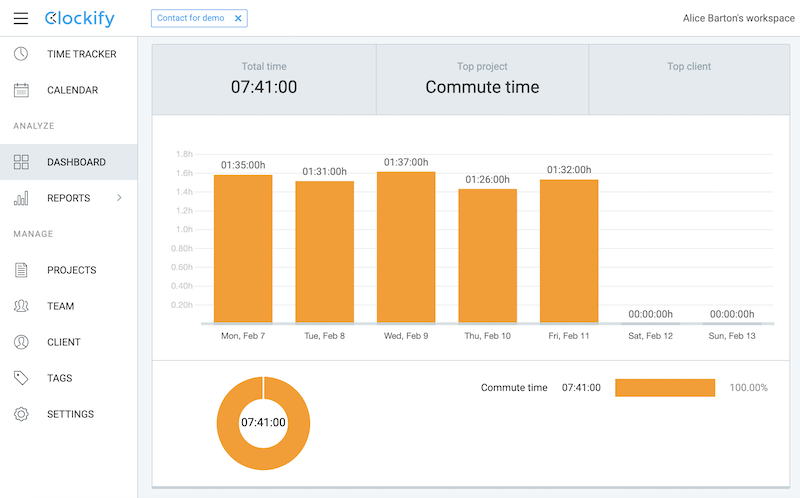
Clockify lets you see the exact time you spent commuting
After a while of tracking commute time, perhaps you’ll find that:
- Your real-time commute takes more or even less than you always thought — this information may help you plan and schedule your work days in the future better.
- You spend less time on commutes on Thursday — because the traffic jams are less severe.
You can even track your time while trying out several routes to work and find the one that gets you to your destination faster than the others.
It’s never a bad idea to try out different means of commuting, just so you can find the fastest one. Maybe you’ll notice that it takes you 45 minutes to get to work by car (because of the traffic jam), while you need only 36 minutes to arrive at the office by bike.
Also, when you know how much time you spend travelling to work, it’s much easier to decide on how best to spend that time.
Conclusion
As much as we dislike having to give up on our precious time, commutes are usually a necessity to millions of workers around the world.
But, some people have it better — they have surprisingly short commutes. Others, on the other hand, are bound to undertake extremely long commutes. The rest of the people’s “commutes” last for as long as they need to get from their bedrooms to their home offices.
However, if you have no other choice but to put on your best smile and try to arrive at a brick and mortar office in time, remember:
No matter whether you travel by car, train, metro, van, ferry, bike or paramotor, or whether your journey takes 10 minutes or 6 hours, it’s possible to find a way to commute efficiently — the one that implies you enjoy your work travel and productively make use of this time.
You just have to find what would work best for you.
✉️ How much time do you spend commuting? Do you have an unusual commute story for all the world to hear? Let us know at blogfeedback@clockify.me and we might include your experience in this one or one of our future articles.



